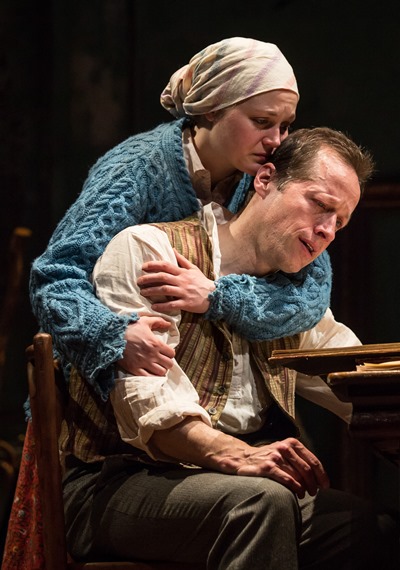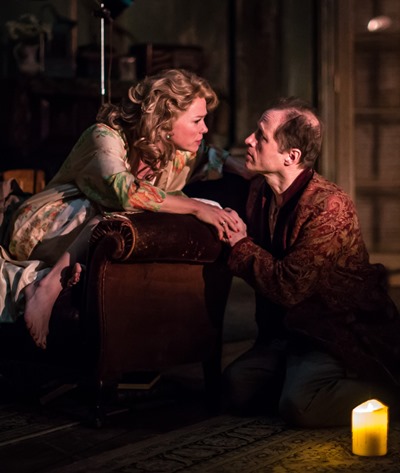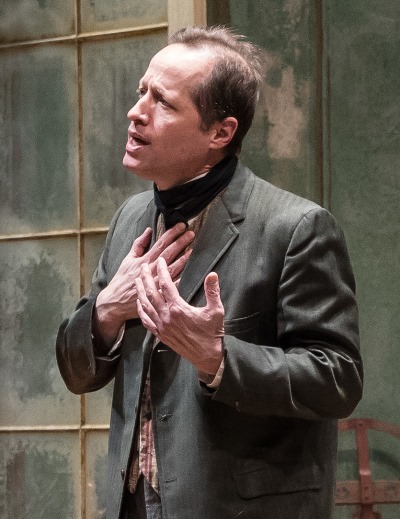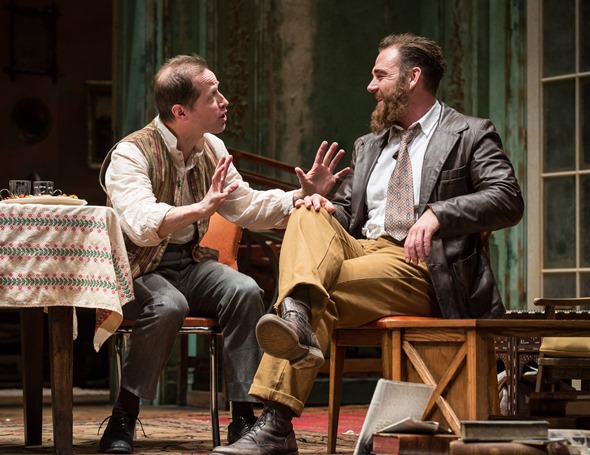‘Uncle Vanya’ at Goodman: Seeking purpose, or a numbing refill when the glass is drained
Review: “Uncle Vanya” by Anton Chekhov, adapted by Annie Baker, at Goodman Theatre. Through March 19. ★★★★★
By Lawrence B. Johnson
Chekhov’s “Uncle Vanya,” an existential snapshot of lost souls at a signless crossroads, exemplifies theater as an ensemble endeavor. In Annie Baker’s modernized, razor-sharp adaptation of the play, complemented by a directorial tour de force from Robert Falls, Goodman Theatre brings the spirit of dramatic teamwork to vibrant life.
 At the center of “Uncle Vanya” looms the specter of bourgeois ennui. Like its three companions among Chekhov’s four great plays – “The Seagull,” “The Cherry Orchard” and “Three Sisters” rounding out the group – this one is, so to speak, driven by inaction and populated by characters either out of touch with themselves, trapped on a gerbil wheel of circumstance or simply bored with life.
At the center of “Uncle Vanya” looms the specter of bourgeois ennui. Like its three companions among Chekhov’s four great plays – “The Seagull,” “The Cherry Orchard” and “Three Sisters” rounding out the group – this one is, so to speak, driven by inaction and populated by characters either out of touch with themselves, trapped on a gerbil wheel of circumstance or simply bored with life.
Vanya, a man of 47, and his niece Sonya live together on a revenue-generating country estate for the financial benefit of their distinguished old scholarly kinsman Alexander, to whom they send a regular stipend. In order to do this, they themselves live quite meagerly.
When the play opens, Alexander, now retired, is visiting, accompanied by his gorgeous young wife Yelena. The infatuated Vanya circles about her, pressing his adoration at every moment, but to no avail. He has a low-key but splendid rival for Yelena’s attention in Mikhail Astrov, a neighboring doctor who’s constantly on call and perpetually worn out as a result. And to complicate the household one degree more, Sonya, a warm-hearted but rather plain young woman, utterly pines for the unmarried doctor, who sees her only as part of the long-familiar furnishings of his life.
 They’re a fascinating if not especially attractive lot, this gaggle of mopers. But I should amend that, and it’s in the amending that we begin to sort this sorry lot, one from another. Which also brings me back to the point of “Uncle Vanya” as ensemble theater. Whom do we really care about, or become interested in? The truth is, and herein lies the beauty of this play, you can jump in anywhere with a single character and work outward to embrace them all.
They’re a fascinating if not especially attractive lot, this gaggle of mopers. But I should amend that, and it’s in the amending that we begin to sort this sorry lot, one from another. Which also brings me back to the point of “Uncle Vanya” as ensemble theater. Whom do we really care about, or become interested in? The truth is, and herein lies the beauty of this play, you can jump in anywhere with a single character and work outward to embrace them all.
The great professor, Alexander, beneficiary of Vanya and Sonya’s devoted labors, doesn’t mope. No, he demands, arrogates. (Disillusioned Vanya might add postures.) David Darlow offers a deliciously presumptuous scholar: imperious, self-absorbed, pinched. His very opposite is Caroline Neff’s kindly, soft-spoken Sonya, the old man’s daughter, who tries not to grumble but ultimately cannot bear the weight on her unrequited heart.
Yelena, the professor’s new wife, is the sparking catalyst: Through no fault beyond her beauty and the sheer vivacity she brings to this world-weary household, she churns a cauldron of troubles. Kristen Bush brings a fetching mix of unself-conscious allure and stolid acceptance of the misstep a naive girl once took in falling for an eminent elder.
 Then there’s Vanya himself, a proto-Sartre character who will not take responsibility for his own situation. He wrings his hands and whines about the emptiness of his wasted life. Tim Hopper has Vanya spot-on, this feckless guy who throws himself at Yelena in abject yearning, grieves over the lost years – and can’t even rid himself of a tormentor from point-blank range.
Then there’s Vanya himself, a proto-Sartre character who will not take responsibility for his own situation. He wrings his hands and whines about the emptiness of his wasted life. Tim Hopper has Vanya spot-on, this feckless guy who throws himself at Yelena in abject yearning, grieves over the lost years – and can’t even rid himself of a tormentor from point-blank range.
All of which leaves the doctor, surely the most complicated and sympathetic of these misérables. Marton Csokas shows us a man whose goodness, professional integrity and awareness (he’s committed to preserving the district’s forests) transcend his melancholy, his excessive drinking and his despair over the steep downward path of humanity.
Of the minor characters, Mary Ann Thebus is an ornament as the superannuated Marina, the nanny who keeps the samovar percolating and understands that when a man’s about to hit the road, one good gulp of vodka deserves another.
Bravos as well for Todd Rosenthal’s evocatively detailed parlor set and Ana Kuzmanic’s colorful and expressive costumes.
First and last, however, credit must go to Annie Baker for an adaptation, a poetic text, that captures the essence of “Uncle Vanya” and preserves its milieu, while at the same time sharpening the experience to a cutting edge of currency.
Related Links:
- Performance location, dates and times: Details at TheatreinChicago.com
- Preview of Goodman Theatre’s complete 2016-17 season: Read it at Chicago On the Aisle
Tags: Ana Kuzmanic, Annie Baker, Anton Chekhov, Caroline Neff, David Darlow, Goodman Theatre, Kristen Bush, Marton Csokas, Mary Ann Thebus, Robert Falls, Tim Hopper, Todd Rosenthal, Uncle Vanya


